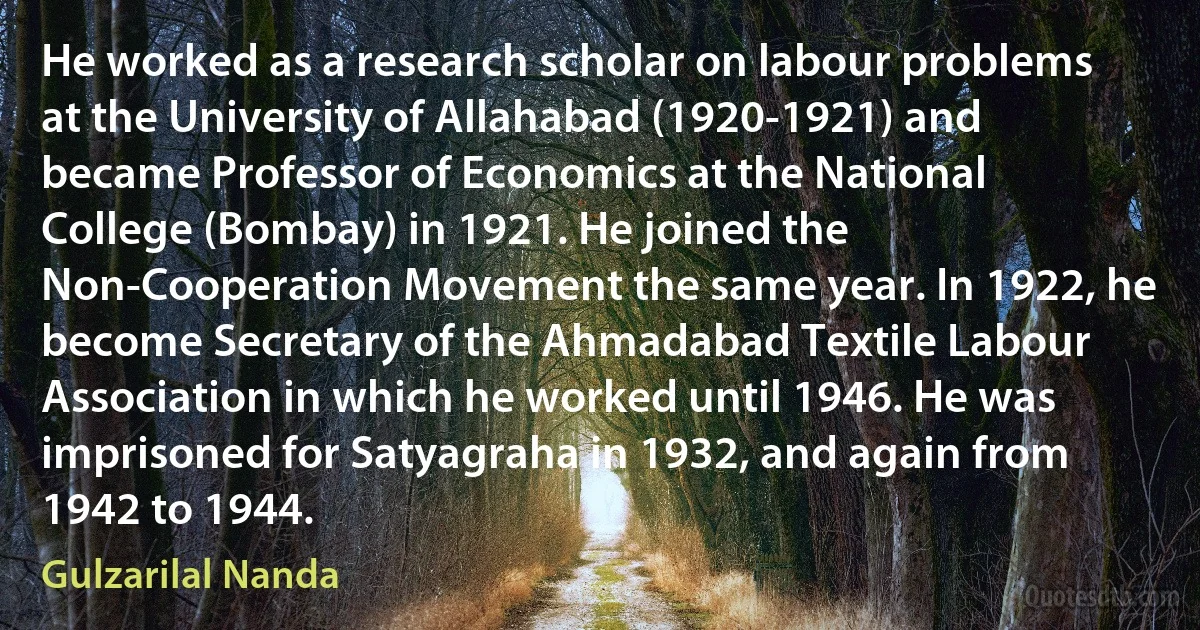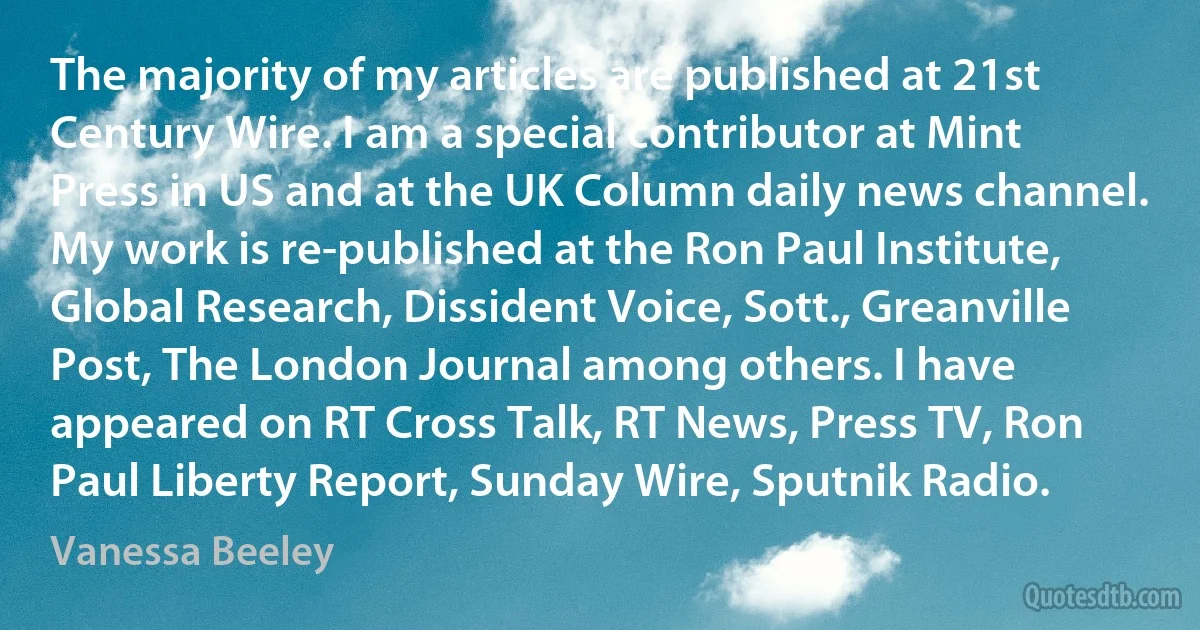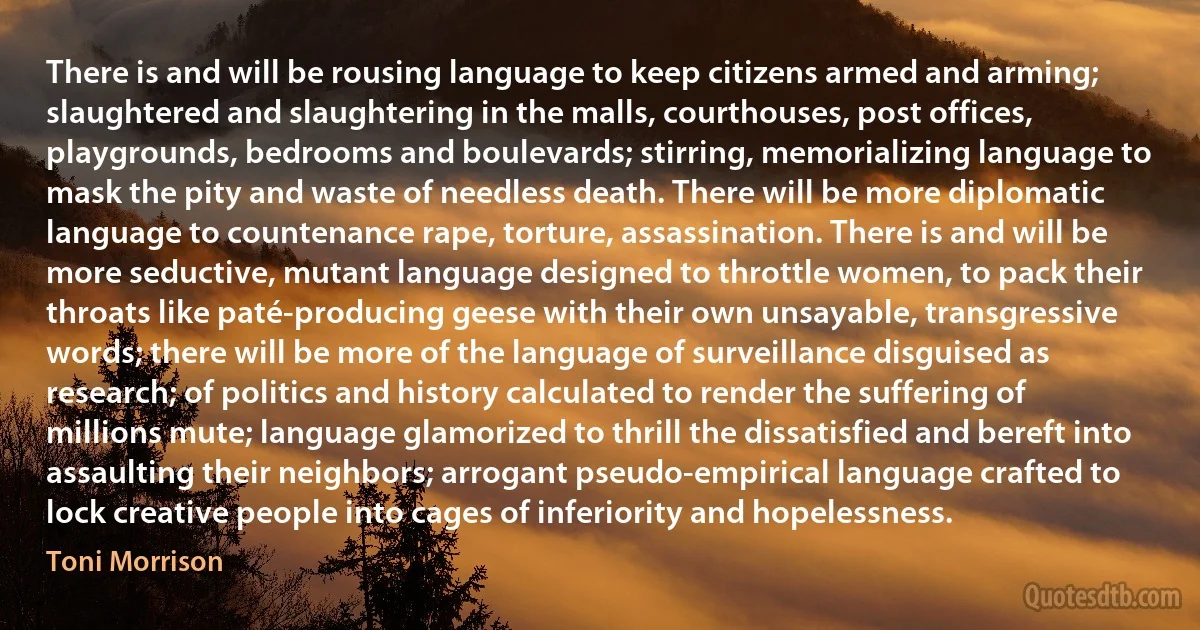Research Quotes - page 65
There is no leader and there is no led. A leader, if one chooses to identify one, has to be a cultivator rather than a manufacturer. He has to provide the soil and the overall climate and the environment in which the seed can grow. One wants permissive individuals who do not have a compelling need to reassure themselves that they are leaders through issuing instructions to others; rather they set an example through their own creativity, Love of nature and dedication to what one may call the 'scientific method.' These are the leaders we need in the field of education and research.

Vikram Sarabhai
Claudius Ptolemy's great contribution to astronomy was his famous work the Almagest, which presented formally the astronomical theories of the day that had evolved from the great debates within the different Greek philosophical schools. Claudius Ptolemy freely admitted that he had contributed little original research to the treatise but rather had based his conclusions principally on the work of Hipparchus. ...Ptolemy did not claim that his cosmological model described the actual conditions. It simply reproduced geometrically the observed motions of the known heavenly bodies and enabled their positions to be easily predicted for any particular time. ... Ironically, even when Copernicus' heliocentric theory had replaced the Ptolemaic system, many astronomers used Ptolemy's model to predict the motion of the planets, since its intricate calculations produced more accurate values.

Ptolemy
The Department of Homeland Security defines the Defense Industrial Base as "the worldwide industrial complex that enables research and development, as well as design, production, delivery and maintenance of military weapons systems, subsystems, and components or parts, [emphasis added]. The Defense Industrial Base provides "products and services that are essential to mobilize, deploy, and sustain military operations." Does it include regular commercial services purchased by the US military? No. The definition specifically excludes the purchase of regular commercial services. Whatever makes Google a "key member of the Defense Industrial Base," it is not recruitment campaigns pushed out through Google AdWords or soldiers checking their Gmail.

Julian Assange
This congeniality is another illusion. I loathe Gogol's moralistic slant, I am depressed and puzzled by his utter inability to describe young women, I deplore his obsession with religion. Verbal inventiveness is not really a bond between authors, it is merely a garland. He would have been appalled by my novels and denounced as vicious the innocent, and rather superficial, little sketch of his life that I produced twenty-five years ago. Much more successful, because based on longer and deeper research, was the life of Chernyshevski (in my novel The Gift), whose works I found risible, but whose fate moved me more strongly than did Gogol's. What Chernyshevski would have thought of it is another question-- but at least the plain truth of documents is on my side. That, and only that, is what I would ask of my biographer-- plain facts, no symbol-searching, no jumping at attractive but preposterous conclusions, no Marxist bunkum, no Freudian rot.

Vladimir Nabokov
The interest of research workers has frequently been focused on the phenomenon of regularly shaped crystals suddenly forming from a liquid, e.g. a supersaturated salt solution. According to the atomic theory the forming force in this process is to a certain extent the symmetry characteristic of the solution to Schrödinger's wave equation, and to that extent crystallization is explained by the atomic theory. Nevertheless this process retains a statistical and - one might almost say - historical element which cannot be further reduced: even when the state of the liquid is completely known before crystallization, the shape of the crystal is not determined by the laws of quantum mechanics. The formation of regular shapes is just far more probable than that of a shapeless lump. But the ultimate shape owes its genesis partly to an element of chance which in principle cannot be analysed further.

Werner Heisenberg
Whereas the personal unconscious consists for the most part of "complexes", the content of the collective unconscious is made up essentially of "archetypes". The concept of the archetype, which is an indispensable correlate of the idea of the collective unconscious, indicates the existence of definite forms in the psyche which seem to be present always and everywhere. Mythological research calls them 'motifs'; in the psychology of primitives they correspond to Levy-Bruhl's concept of "representations collectives," and in the field of comparative religion they have been defined by Hubert and Mauss as 'categories of the imagination'... My thesis, then, is as follows: In addition to our immediate consciousness, which is of a thoroughly personal nature and which we believe to be the only empirical psyche (even if we tack on the personal unconscious as an appendix), there exists a second psychic system of a collective, universal, and impersonal nature which is identical in all individuals.

Carl Jung
We humans have always defined ourselves by narration. What's happening today is that we're allowing multi-national corporations to tell our stories for us. The theme of corporate stories (and millions drink them in every day) seldom varies: to be happy you must consume, to be special you must conform. Absurd, obviously, yet our identities have become so fragile, so elusive, that we seem content to let advertisers provide us with their version of who we are, to let them recreate us in their image: a cookie-cutter image based on market research, shallow sociology, and insidious lies. Individualism is bad for business – though absolutely necessary for freedom, progressive knowledge, and any possible interface with the transcendent. And yes, it's entirely possible to function as a free-thinking individual without succumbing to narcissism..

Tom Robbins
I don't have a problem with guilt about money. The way I see it is that my money represents an enormous number of claim checks on society. It is like I have these little pieces of paper that I can turn into consumption. If I wanted to, I could hire 10,000 people to do nothing but paint my picture every day for the rest of my life. And the GNP would go up. But the utility of the product would be zilch, and I would be keeping those 10,000 people from doing AIDS research, or teaching, or nursing. I don't do that though. I don't use very many of those claim checks. There's nothing material I want very much. And I'm going to give virtually all of those claim checks to charity when my wife and I die.

Warren Buffett
We must expect that these German scientists, once they get here, will continually try to defend the actions of Germany before and during the war. Their background and education wiil have supplied them with the necessary arguments. The rocket specialists have at times tried to convince us that they worked on rockets only for the purpose of scientific research. The German atomic scientists, who failed in their attempt to make a bomb, planned to deny that they wanted to make one.

Samuel Abraham Goudsmit
If only we could get hold of a German atomic physicist, we felt, we could soon find out what the rest of them were up to. To us physicists the problem seemed very simple. Even those of us who were not working on the atom bomb project knew pretty well what was going on over here. No amount of military security could have prevented us from knowing, difficult as it was for the military to understand this. Active scientists engaged in the same general field of research inevitably form a kind of clan; they work closely together and know all about each other's specialities and whereabouts. You can't take a group of key scientists from their accustomed haunts and have them disappear in some remote place in New Mexico, together with their families, without their colleagues who are left behind wondering about it and deriving the right conclusions. The same thing, we knew, would be true of the Germans.

Samuel Abraham Goudsmit
There's all of this concern about what's gain-of-function or what's not, with the implication that that research led to SARS-CoV-2, and COVID-19, which, George, unequivocally anybody that knows anything about viral biology and phylogeny of viruses know that it is molecularly impossible for those viruses that were worked on to turn into SARS-CoV-2 because they were distant enough molecularly that no matter what you did to them, they could never, ever become SARS-CoV-2.

Anthony Fauci
Science, education, research and innovation are the four pillars on which the development as well as the work culture of a nation rests. Scientific temperament cannot happen unless we improve the delivery of education at all levels. The government [India] has announced the Science, Technology and Innovation Policy. One of the key elements of the policy is to position India among the top five global scientific powers by 2020.

Pranab Mukherjee
The history of human thought recalls the swinging of a pendulum which takes centuries to swing. After a long period of slumber comes a moment of awakening. Then thought frees herself from the chains with which those interested - rulers, lawyers, clerics - have carefully enwound her.
She shatters the chains. She subjects to severe criticism all that has been taught her, and lays bare the emptiness of the religious political, legal, and social prejudices amid which she has vegetated. She starts research in new paths, enriches our knowledge with new discoveries, creates new sciences.
But the inveterate enemies of thought - the government, the lawgiver, and the priest - soon recover from their defeat. By degrees they gather together their scattered forces, and remodel their faith and their code of laws to adapt them to the new needs.

Peter Kropotkin
If the Dodgers had kept Clemente with them at Ebbets Field-as they did with Sandy Koufax-the course of baseball might have been drastically changed. This intrigued me and I did some research on the subject. For years, the Dodgers kept looking for a left fielder to pair up with Duke Snider in center and Carl Furillo in right. This might have been an all-time outfield: Clemente-Snider-Furillo. Imagine Clemente taking dead aim at the comfortable home-run area in Ebbets Field for four years and the short left field fence in the Coliseum for the next three years. The Dodgers won the pennant in 1955 and again in 1956. They won after a playoff in 1959 and copped it again in 1963. But wouldn't it be safe to assume they could have won in 1957, 1958, 1960, 1961 and 1962 with a Clemente in their lineup?

Roberto Clemente
The grand discoveries which scientific experiment yielded at and about the turn of the century, in which investigators in many countries took an eminent part and which were destined all unexpectedly to give us a fresh insight into the structure of atoms, were due in the first instance, as all are aware, to the work of the great investigators of the English school, Sir Joseph Thomson and Sir Ernest Rutherford, who have inscribed their names on the tablets of the history of scientific research as distinguished witnesses to the truth that imagination and acumen are capable of penetrating the crowded mass of registered experience and of revealing Nature's simplicity to our gaze.

Niels Bohr
[Interview: Responding to a question about whether it was smart to publish his 1969 article at the time he did] In retrospect, however, I would hope that I would not have changed a thing in that article, even if I had been able to imagine the supposed "storm" it caused. I will be ashamed the day I feel I should knuckle under to social-political pressures about issues and research I think are important for the advance of scientific knowledge.

Arthur Jensen
Research is a matter of overcoming obstacles. That's what research is about. There are problems. There are difficulties. It's hard to make sense of a collection of information or whatever. Obstacles are the nature of research. Maybe that's why some people give up. There's always an obstacle. You overcome one to find there's another one.

Alexander Dalgarno
You know, I would say Incomplete...but what I would say is the steps that we have taken in saving the auto industry, in making sure that college is more affordable and investing in clean energy and science and technology and research, those are all the things that we are going to need to grow over the long term.

Barack Obama
There are a lot of wealthy, successful Americans who agree with me - because they want to give something back. They know they didn't - look, if you've been successful, you didn't get there on your own. You didn't get there on your own. I'm always struck by people who think, "well, it must be because I was just so smart." There are a lot of smart people out there. "It must be because I worked harder than everybody else." Let me tell you something - there are a whole bunch of hardworking people out there.If you were successful, somebody along the line gave you some help. There was a great teacher somewhere in your life. Somebody helped to create this unbelievable American system that we have that allowed you to thrive. Somebody invested in roads and bridges; if you've got a business, you didn't build that. Somebody else made that happen. The Internet didn't get invented on its own. Government research created the Internet so that all the companies could make money off the Internet.

Barack Obama
Our celebration of initiative and enterprise, our insistence on hard work and personal responsibility, these are constants in our character. But we have always understood that when times change, so must we; that fidelity to our founding principles requires new responses to new challenges; that preserving our individual freedoms ultimately requires collective action. For the American people can no more meet the demands of today's world by acting alone than American soldiers could have met the forces of fascism or communism with muskets and militias. No single person can train all the math and science teachers we'll need to equip our children for the future, or build the roads and networks and research labs that will bring new jobs and businesses to our shores. Now, more than ever, we must do these things together, as one nation and one people.

Barack Obama



